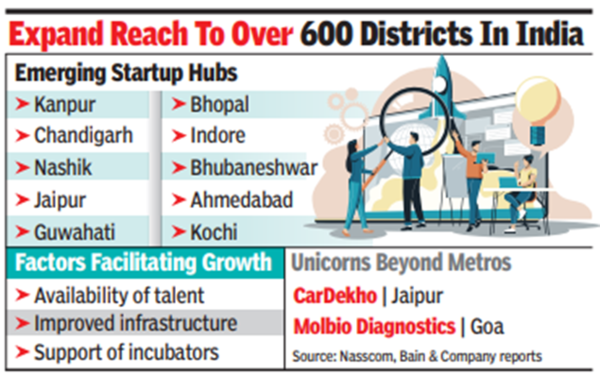Mumbai: Littlebox, a D2C fashion startup from Guwahati, recently bagged a rare all-investor deal on Sony Liv’s reality TV show Shark Tank. The founders’ clarity on business fundamentals and the firm’s decent growth prodded one of the investors to enquire about the state of the startup ecosystem in Assam.
Startups
from states like Rajasthan, Uttarakhand, Bihar and Odisha pitched for investments as well – and while not all may have garnered funding, it underlined the trend that the idea of a startup is getting mainstream and cities beyond Bengaluru, Mumbai and Delhi-NCR are becoming a breeding ground for entrepreneurship.
The emergence of startups from tier-2 and 3 towns is not a new phenomenon but it is growing, helped by better availability of talent which partly can be attributed to the establishment of regional offices by IT and tech firms, support from govt and a robust digital infrastructure.
In fact, the share of seed stage deals for startups from beyond top three metros improved in 2023 from 2022, analysts at Bain & Company said, categorising Nashik and Jaipur among
emerging
startup hubs. About 24% of 628 deals were cornered by startups from other cities (includes
non-metros
, tier-2 towns) in 2023 compared to 20% of 970 deals in 2022. With the pool of venture capital widening, investors are looking for opportunities “beyond the obvious” and are scouting for better deals in the seed and early stages which requires deployment of lower amount of capital, Ramdoss Seetharaman, senior partner at McKinsey & Company, told TOI.
Today, startups have expanded their reach to more than 600 Indian districts. A Nasscom study conducted last year showed that smaller towns produce 60% of overall graduates and an estimated 11-15% of the tech talent is based in tier-2 and 3 towns. It is not surprising then that startups ranging from fashion, mobility, food & beverages and technology are being built out of these areas. Unicorn startup CarDekho, which is valued at $1.2 billion, is based in Jaipur while Molbio Diagnostics, which turned unicorn in 2022, is from Goa.
Better infrastructure is also enabling people to work remotely without compromising on the quality of the talent being hired. “Improving infrastructure allows startups to establish companies in low cost locations,” analysts said.
Incubators and accelerators have also contributed to the broadening of the startup ecosystem, with govt backed incubator programmes and those by academic institutions like the IITs having played their part. Incubators bridge network and resource gaps for startups based in tier-2 cities and beyond. For perspective: more than 200 startups received funding worth over $80 million from Rajasthan govt’s iStart incubator programme since its inception in 2017, the Bain study showed.
Seetharaman said that India will see the emergence of more deep tech, innovation led startups in the next decade and some of these are likely to be based in cities with good institutions which can provide them with relevant resources and expertise.


